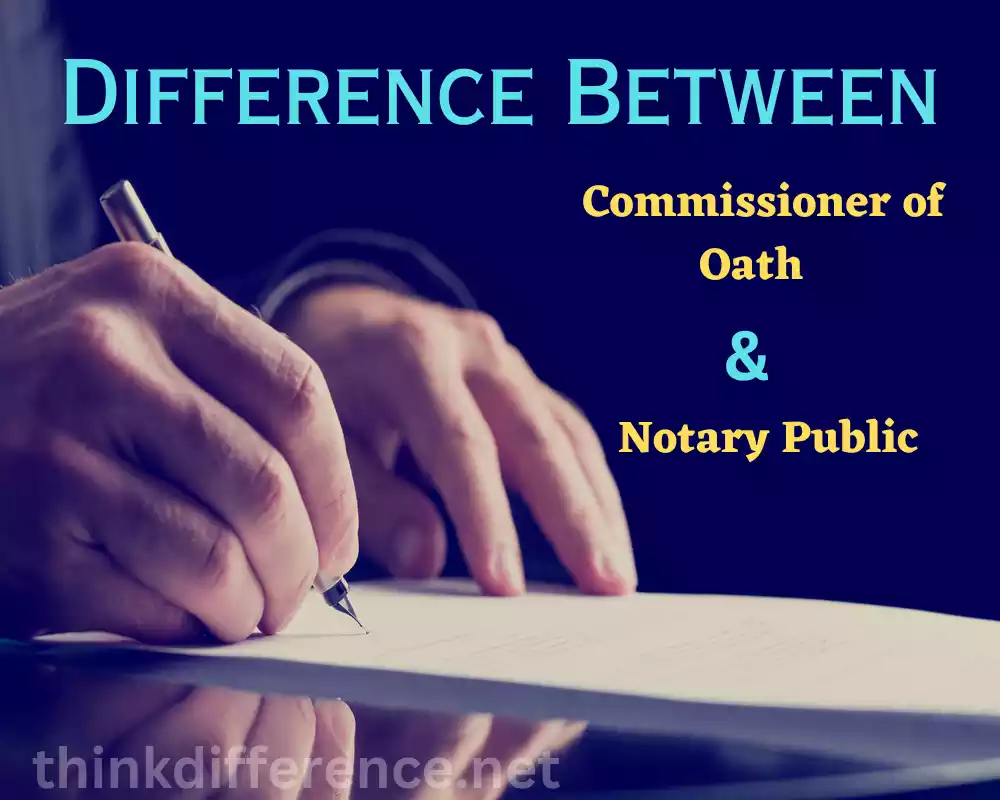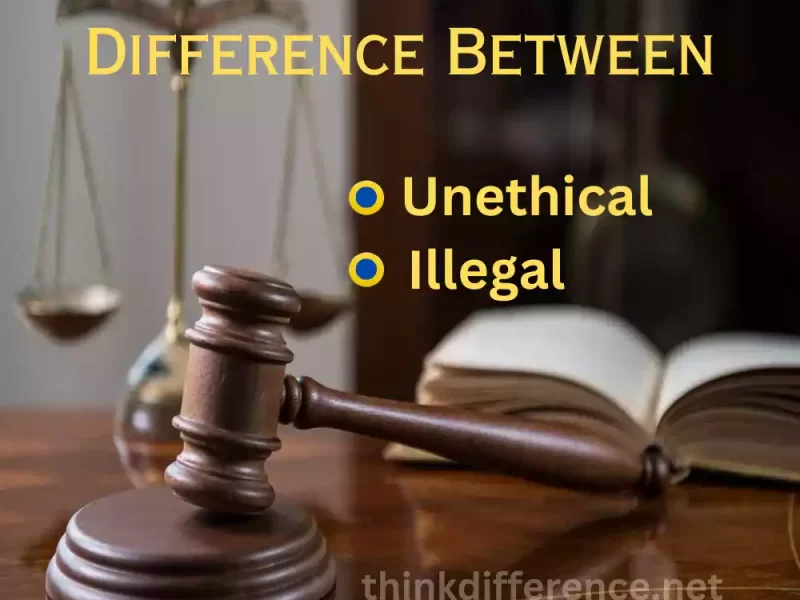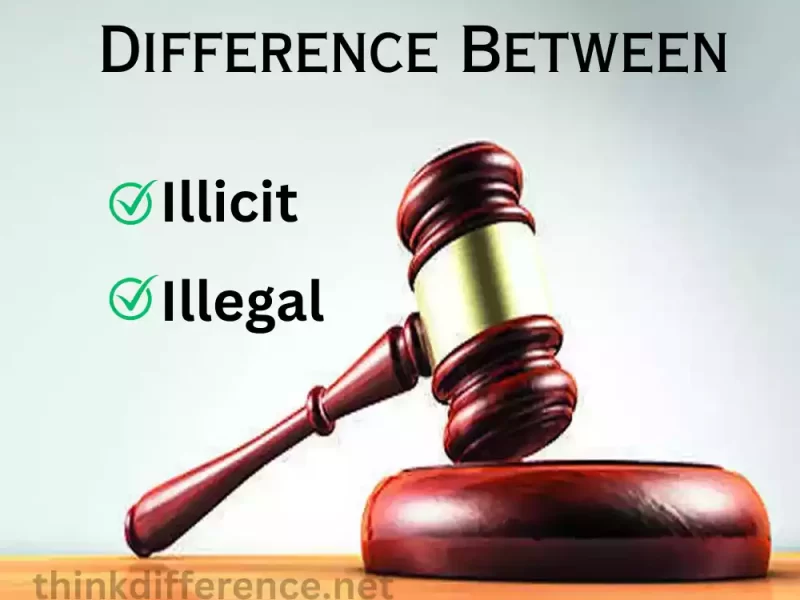Commissioner of Oath and Notary Public are appointed individuals tasked with administering oaths, administer statements, and witness signatures in legal documents to certify their authenticity and maintain integrity and authenticity of documents that people, groups, and organizations rely upon as legal proofs of identity and validity. They assure people that these legal documents are legal and genuine.
Understanding the differences between the Commissioner of Oath and the Notary Public is important for individuals seeking to authenticate their legal documents and ensure compliance with the specific regulations governing their jurisdiction.
This content outline will explore the definitions, functions, limitations, and similarities between these two roles, providing clarity on the distinctions and helping individuals make informed decisions when it comes to document authentication.
What is a Commissioner of Oath?
A Commissioner of Oath is an individual authorized by law to administer oaths and affirmations and to witness and authenticate signatures on various legal documents. A Commissioner of Oath serves to verify both the legality and authenticity of documents by affirming their claims as true and correct.
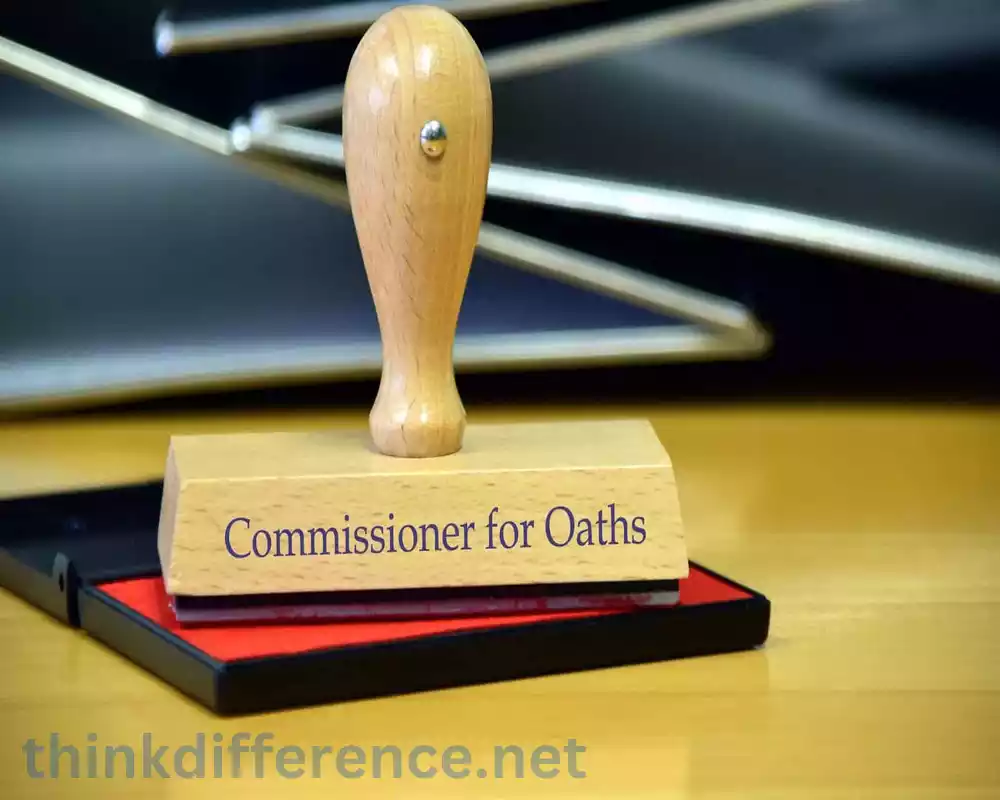
Commissions of Oaths are appointed by government authorities or legal organizations and typically come from backgrounds in law such as magistrates, lawyers, or judges. Their purpose is to administer oaths and affirmations which require individuals to make truthful statements regarding documents they sign or the truthfulness of statements made against their person or documents presented as proof. Commissioners of Oath also have the power to witness signatures on legal documents, ensuring that they have been properly executed.
The primary function of a Commissioner of Oath is to provide a level of assurance and credibility to the documents they authenticate. Legal professionals play an indispensable role in legal proceedings such as the signing of the Affidavit or Statutory Declaration or other Sworn declarations. By affixing their seal or stamp and signing the documents, Commissioners of Oath confirm that the statements made within them are made under oath or affirmation, and that the signatures are genuine.
It’s important to note that the authority and jurisdiction of Commissioners of Oath may vary from one jurisdiction to another. Some Commissioners of Oath may have limited geographical jurisdiction or restricted authority over certain types of documents. It’s advisable to consult the specific laws and regulations of the relevant jurisdiction to understand the exact scope and limitations of a Commissioner of Oath’s powers and responsibilities.
Duties and Responsibilities of a Commissioner of Oath
The duties and responsibilities of a Commissioner of Oath typically include the following:
- Administering Oaths and Affirmations: Commissioners of Oath have the authority to administer oaths and affirmations to individuals. Make certain the person understands and accepts the implications and significance of making an accurate declaration, affirm or swear to its accuracy under penalty of perjury, as this ensures they make their declaration with sincerity and truthfulness.
- Witnessing Signatures: A Commissioner of Oath serves as a witness to the signing of legal documents. They verify the identity of the person signing and ensure that the signature is genuine. This witnessing helps establish the authenticity and validity of the document.
- Certifying True Copies of Documents: Commissioners of Oath may be authorized to certify true copies of original documents. Process requires comparing a copy to its original form and verifying whether or not it is an exact and true replica of what originally existed.
- Affixing Seal or Stamp: When authenticating documents, Commissioners of Oath often affix their official seal or stamp on the document. This seal or stamp signifies that the document has been properly authenticated by them.
- Ensuring Compliance with Legal Requirements: Commissioners of Oath are responsible for ensuring that the authentication process complies with the legal requirements and regulations of their jurisdiction. They must adhere to the prescribed procedures and guidelines to maintain the integrity and legality of the documents they authenticate.
- Record Keeping: Commissioners of Oath may be required to maintain records of the documents they have authenticated. Information such as date, document type, names of those contained within, as well as any pertinent details may also be provided here.
- Providing Expertise and Advice: Commissioners of Oath may offer guidance and advice to individuals regarding the proper execution and authentication of legal documents. They may explain legal requirements, clarify doubts, and assist in ensuring that the documents meet the necessary standards.
It’s important to note that the specific duties and responsibilities of Commissioners of Oath may vary depending on the jurisdiction and the laws governing their appointment. It is advisable to consult the relevant legislation or seek professional guidance to understand the precise scope of responsibilities for a Commissioner of Oath in a particular jurisdiction.
What is a Notary Public?
An Notary Public is an official appointed by the government to serve as an impartial witness during execution of legal documents, verifying signatures and oaths as well as validating legal cases and legal cases documents. Their duty includes authenticating signatures and verifying documents used as legal evidence.

Notaries Public are authorized by law to perform various services including but not limited to:
- Administering Oaths and Affirmations: Notaries Publics have the authority to administer oaths and affirmations statements on behalf of individuals to validate documents or verify information that has been presented in good faith, for instance confirming its contents or truthfulness of an assertion made against it.
- Witnessing Signatures: Notaries Public witness the signing of legal documents and verify the identities of the signatories. They ensure that the individuals signing the documents are doing so willingly and are of sound mind.
- Certifying True Copies of Documents: Notaries Public can certify copies of original documents, making them legally equivalent to the original. This is often required for documents like passports, educational certificates and other important records.
- Preparing and Attesting Legal Documents: In some jurisdictions, Notaries Public have the authority to draft, prepare and attest certain legal documents, such as wills, contracts, powers of attorney and deeds.
Notaries Public are appointed by government authorities, such as state governments or regulatory bodies and their appointments typically last for a designated term. The qualifications and requirements to become a Notary Public vary by jurisdiction but generally include educational prerequisites, passing an examination and meeting other eligibility criteria.
Notaries Publics play an essential part in guaranteeing authenticity and trustworthiness for legal documents, providing impartial verification that allows court admissibility as well as recognition by government bodies and institutions.
Remember that Notaries Public may vary based on which state law they operate in and its corresponding limitations and powers that could govern their duties as notaries publics may differ depending on where you operate in.
The Role of a Notary Public
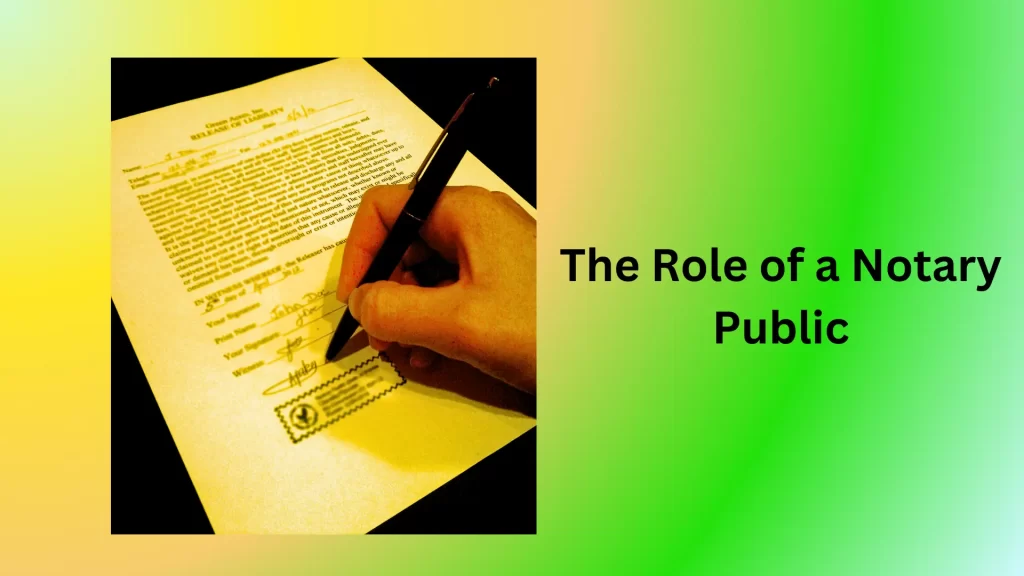
The role of a Notary Public encompasses several important functions in the authentication of legal documents.
The primary responsibilities of a Notary Public include:
- Administering Oaths and Affirmations: Notaries Public have the authority to administer oaths and affirmations to individuals. This involves ensuring that the person understands the significance of providing a truthful statement and confirming their commitment to the accuracy of the document or statement.
- Witnessing Signatures: As impartial witnesses, Notaries Public verify the identities of individuals signing legal documents and ensure that they are signing voluntarily and with full understanding. They observe the signing process to establish the authenticity and validity of the signatures.
- Certifying True Copies of Documents: Notaries Public can certify copies of original documents, making them legally equivalent to the original. This involves comparing the copy with the original and certifying that it is a true and accurate reproduction.
- Notarizing Documents: Notaries Public notarize documents by affixing their official seal or stamp, along with their signature and the date. This act of notarization confirms that the document has been properly executed, witnessed and authenticated according to the requirements of the jurisdiction.
- Verifying Authority and Identity: Notaries Public often verify the authority of individuals who are signing documents on behalf of an organization or entity. They may request proof of authorization or identification to ensure that the person signing has the legal capacity to do so.
- Maintaining Records: Notaries Public typically maintain a record book or journal of the documents they notarize. Notes for cases are usually comprised of basic information like date, type of document used and persons involved, as well as any relevant details pertinent to that specific instance. The record book serves as a reference and provides a historical record of the notarial acts performed.
- Providing Notarial Certificates: Notaries Public issue notarial certificates for each document they notarize. Documents generated through notarization contain vital details regarding its process such as dates, times, names of parties involved as well as an explanation for each certificate issued. The certificate serves as evidence of the notarial act and provides a reference for future use.
- Adhering to Legal and Ethical Standards: Notaries Public must comply with the legal requirements and ethical standards governing their profession. An intermediary must remain impartial, avoid conflicts of interest and guarantee the security and confidentiality of all the data they process.
Keep in mind that the exact duties and powers a notary public has can differ depending on their state and legal framework of appointment. Notaries Public should familiarize themselves with the specific regulations in their jurisdiction to ensure they fulfill their responsibilities effectively and in accordance with the law.
Differences between a Commissioner of Oath and a Notary Public
There are several key differences between a Commissioner of Oath and a Notary Public. These differences primarily lie in their appointment process, authority and powers, jurisdiction, scope of practice, recognition of documents and fees.
Here are the main distinctions:
- Appointment and Qualifications:
- Commissioner of Oath: Commissioners of Oath are typically appointed by government authorities or legal bodies. They may have specific educational and professional requirements, such as being a lawyer, judge or magistrate.
- Notary Public: Notaries Public are also appointed by government authorities or regulatory bodies but the specific qualifications and requirements vary by jurisdiction. Generally, individuals must meet certain educational prerequisites, pass an examination, and meet other eligibility criteria.
- Authority and Powers:
- Commissioner of Oath: Commissioners of Oath have the authority to administer oaths and affirmations, witness signatures, and certify true copies of documents. Their powers are typically limited to these specific functions.
- Notary Public: Notaries Public have broader powers compared to Commissioners of Oath. They can administer oaths and affirmations, witness signatures, certify true copies and may also have the authority to prepare and attest legal documents, such as wills, contracts, and powers of attorney, depending on the jurisdiction.
- Jurisdiction and Geographic Limitations:
- Commissioner of Oath: Commissioners of Oath may have limited geographic jurisdiction. Their authority to authenticate documents is often restricted to a specific region or area.
- Notary Public: Notaries Public generally have a wider jurisdiction and are recognized throughout their jurisdiction or even internationally, depending on the jurisdiction. Their authority extends beyond specific geographic limitations.
- Scope of Practice:
- Commissioner of Oath: Commissioners of Oath primarily deal with documents that require oaths, affirmations or signature witnessing. They focus on administering oaths, affirmations and certifying the authenticity of documents.
- Notary Public: Notaries Public have a broader scope of practice. In addition to administering oaths and affirmations, they may be involved in preparing and attesting legal documents and performing other functions specific to their jurisdiction.
- Recognition and Validity of Documents:
- Commissioner of Oath: Documents authenticated by a Commissioner of Oath are generally recognized and valid within the jurisdiction where they are appointed. Their authority may not extend to other jurisdictions.
- Notary Public: Documents notarized by a Notary Public often have wider recognition and validity, not only within their jurisdiction but also in other jurisdictions. Notarized documents are often accepted as evidence in courts and recognized by government agencies and institutions.
- Fees and Remuneration:
- Commissioner of Oath: The fees charged by Commissioners of Oath for their services may vary and they may be regulated by specific fee structures set by the government or relevant authorities.
- Notary Public: Notaries Public usually have prescribed fee structures for their services, which may be regulated by government authorities or professional organizations.
It’s important to note that the specific differences between Commissioners of Oath and Notaries Public can vary by jurisdiction. It is advisable to consult the laws and regulations of the specific jurisdiction to understand the exact distinctions and limitations of each role.
How to Become a Commissioner of Oath or Notary Public
The process of becoming a Commissioner of Oath or a Notary Public varies depending on the jurisdiction. The following steps provide a general overview of the typical requirements and procedures:
Becoming a Commissioner of Oath:
- Research the Requirements: Start by researching the specific requirements to become a Commissioner of Oath in your jurisdiction. These requirements may include educational prerequisites, professional qualifications or specific experience in the legal field.
- Meet the Eligibility Criteria: Check that your qualifications meet those set forth by government or legal authorities before proceeding further. This may include having a law degree, being a practicing lawyer, judge or magistrate or meeting any other specific qualifications.
- Complete Required Training: Depending on the jurisdiction, you may need to complete a training program or educational course related to the role of a Commissioner of Oath. This training may cover topics such as oath administration, document authentication and legal procedures.
- Apply for Appointment: Once you have met the necessary requirements, you can apply for appointment as a Commissioner of Oath. This typically involves submitting an application form, along with any required documentation and fees, to the relevant government authority or legal body responsible for the appointment.
- Background Check and Review: At various points during the appointment process, an investigation or review may occur of your background and qualifications. This could involve verifying your credentials, conducting reference checks or ensuring you have a good standing within the legal profession.
- Appointment and Swearing-In: If your application is approved, you will be appointed as a Commissioner of Oath. This may involve taking an oath of office or making a solemn declaration before an authorized individual or authority.
Becoming a Notary Public:
- Research the Requirements: Research the specific requirements and qualifications to become a Notary Public in your jurisdiction. These requirements may differ and it’s essential that one understands their experiential, educational and other requirements.
- Educational Requirements: In some jurisdictions, completing a specific educational program or course related to notarial practice may be required. This could include studying notarial law, ethics, procedures and best practices.
- Meet Eligibility Criteria: Ensure that you meet all the eligibility criteria set by the government or regulatory body responsible for appointing Notaries Public. Acquiring legal expertise may involve earning either an undergraduate degree in law, taking an exam for it and practicing for certain number of years as part of your job duties.
- Pass Exam: Based on your location, an examination may be administered that tests your understanding and knowledge of notarial procedures as well as rules and regulations.
- Application and Appointment Process: Complete all necessary steps in order to become an Notary Public. This typically involves submitting an application form, along with any required documentation, fees and proof of qualifications.
- Background Check and Review: Similar to the process for becoming a Commissioner of Oath, there may be a background check or review of your credentials as part of the appointment process for a Notary Public.
- Commission and Commissioning Ceremony: Upon approval, you will receive a commission as a Notary Public. This commission confirms your appointment and authority as a Notary Public. In some jurisdictions, a commissioning ceremony or taking an oath of office may be required.
The requirements, procedures and prerequisites to become a Commissioner of Oaths and Notary Public can differ substantially based on where you reside. It is advised to review regulations, laws and guidelines relevant to your local jurisdiction in order to follow all required steps properly and meet all conditions necessary.
Importance of Commissioner of Oath and Notary Public in Legal Matters
Commissioners of Oath and Notaries Public play crucial roles in legal matters by providing authentication, verification and impartial witnessing services.
Here are some key reasons why they are important in legal proceedings:
- Document Authenticity and Integrity: Commissioners of Oath and Notaries Public help establish the authenticity and integrity of legal documents. By administering oaths or affirmations and witnessing signatures, they provide assurance that the documents have been properly executed and that the parties involved have affirmed the truthfulness of their statements.
- Legal Recognition and Admissibility: Documents authenticated by Commissioners of Oath and Notaries Public carry a higher level of legal recognition and admissibility. They are often accepted as valid evidence in courts and are recognized by government agencies, financial institutions and other relevant entities.
- Preventing Fraud and Fraudulent Activities: Commissioners of Oath and Notaries Public act as deterrents to fraud and fraudulent activities. Through their careful verification of identities and signatures, they help ensure that individuals are who they claim to be and that the documents they sign are genuine. This helps protect against identity theft, forgery, and other fraudulent practices.
- Public Confidence and Trust: The involvement of Commissioners of Oath and Notaries Public instills public confidence and trust in legal transactions. Their presence and certification provide assurance to parties involved that the documents have been properly executed and that the necessary legal formalities have been followed.
- Compliance with Legal Requirements: Commissioners of Oath and Notaries Public are knowledgeable about the legal requirements and procedures governing the execution and authentication of documents. Their involvement helps ensure that documents meet the necessary legal standards, reducing the risk of potential disputes or challenges based on technicalities.
- International Recognition: Notaries Public, in particular, often have international recognition. Notarized documents are commonly accepted across borders, facilitating international transactions and legal processes. This recognition is valuable for individuals and businesses engaged in cross-border activities.
- Expertise and Guidance: Commissioners of Oath and Notaries Public can provide expertise and guidance regarding the proper execution and authentication of legal documents. They can explain legal requirements, answer questions and assist individuals in ensuring that their documents comply with the necessary standards.
Commissioners of Oath and Notaries Public contribute to the reliability, credibility, and efficiency of legal matters. Their involvement helps maintain the integrity of legal documents and enhances trust in the legal system.
Benefits of Using the Services of a Commissioner of Oath or Notary Public
Using the services of a Commissioner of Oath or a Notary Public offers several benefits in legal matters and document authentication.
Here are some key advantages:
- Document Legitimacy: Commissioners of Oath and Notaries Public provide an official and recognized verification of documents. Their involvement adds credibility and legitimacy to the documents, making them more reliable and trustworthy in legal proceedings.
- Legal Compliance: Commissioners of Oath and Notaries Public are well-versed in the legal requirements and procedures for document execution. Through their services, both individuals and organizations can ensure their documents meet all legal standards set out by applicable regulations and laws.
- Preventing Disputes and Challenges: The involvement of Commissioners of Oath and Notaries Public helps minimize the risk of disputes and challenges related to document authenticity or execution. Their verification and witnessing services provide a solid foundation for the validity of the documents, reducing the likelihood of future legal complications.
- Enhanced Document Acceptance: Documents authenticated by Commissioners of Oath and Notaries Public are more likely to be accepted by courts, government agencies, financial institutions, and other relevant entities. The official seal, signature, and certification provided by these professionals increase the likelihood of document acceptance, recognition and admissibility.
- International Recognition: Notaries Public, in particular, often have international recognition. Documents notarized by a Notary Public are generally accepted across borders, making them suitable for international transactions, immigration processes and other global legal matters. This recognition streamlines processes and reduces the need for additional authentication or translation.
- Expertise and Guidance: Commissioners of Oath and Notaries Public possess expertise in document execution and authentication procedures. By utilizing their services, individuals can benefit from their guidance, ensuring that their documents are properly executed and all necessary legal formalities are met. They can offer advice, answer questions and provide clarification on legal requirements.
- Efficient and Convenient Process: Commissioners of Oath and Notaries Public provide convenient and efficient services. They are equipped with the knowledge and resources to handle the authentication process effectively. Individuals can schedule appointments, have their documents verified and receive the necessary certification or notarization in a streamlined manner.
- Confidence and Peace of Mind: Utilizing the services of Commissioners of Oath and Notaries Public instills confidence and peace of mind. Knowing that the documents have undergone a professional authentication process and have been certified by an impartial authority provides assurance and reduces concerns about the validity and legality of the documents.
As its benefits can differ depending on your location and governing authorities’ regulations, it is wise to research local laws and regulations prior to seeking assistance from experts such as Notaries Public. Doing this can ensure compliance and maximize benefits from their assistance.
Common Documents Handled by Commissioners of Oath and Notaries Public
Commissioners of Oath and Notaries Public handle a variety of documents in their roles. While the specific documents may vary depending on the jurisdiction and the scope of their authority.
Here are some common types of documents that they typically handle:
- Affidavits: These written statements made under oath or affirmation attesting the veracity of information offered are called Affidavits. Commissioners of Oaths and Notaries Public are usually involved with administering affirmations/oath ceremonies as well as witnessing signing of Affidavits.
- Statutory Declarations: These formal statements signed by individuals to verify the information included within a statement are authentic and uphold its accuracy. Commissioners Of Oath or Notaries Public are available to perform or witness these affirmations procedures as well as sign statutory declarations themselves.
- Power of Attorney: An Power of Attorney document grants authority for an individual (the attorney-in-fact) to make decisions for another in terms of finances or legal affairs, acting on their behalf in certain matters. Notaries Public are typically involved with notarizing these documents to verify their authenticity and legitimacy.
- Consent Letters: Consent letters may be required for various reasons, including providing consent to medical treatments, travel plans or participation in certain events. Commissioners of Oaths and Notaries Public can authenticate consent letters by verifying both who is providing it as well as witnessing its signature on the document.
- Certified Copies: Commissioners of Oaths and Notaries Public are capable of authenticating copies made from original documents as legally equivalent copies, making this service useful when dealing with documents such as ID cards, passports, birth certificates, transcripts of academics or any other important papers.
- Notarial certificates: Notaries Public issue notarial certificates on every document they sign as part of the notarial procedure, with information regarding date, place and parties involved as well as an explanation for each document signed by notaries public. Notarial certificates serve as evidence that prove a notary’s act and provide references in future.
- Consent for Travel Documents: When travelling without either parental or guardian oversight, written consent could be needed from both. Commissioners Of Oath or Notaries Public can witness signature of document to confirm its authenticity and provide written confirmation that both consent is given by parent/guardian.
- Witnessing Signatures: Commissioners of Oath and Notaries Public are frequently called upon as witnesses for signatures on legal documents such as contracts, agreements, wills and deeds – their presence helps verify signature authenticity by offering certification services of signatures whose authenticity cannot otherwise be established.
Keep in mind that documents handled by Commissioners of Oath and Notaries Public can vary based on their jurisdiction and legal rules pertaining to them, making consultation with an experienced Commissioner of Oath or Notary Public essential in understanding exactly which papers they manage in your area of responsibility.
Tips for Finding a Reliable Commissioner of Oath or Notary Public
When searching for a reliable Commissioner of Oath or Notary Public, consider the following tips to ensure you find a qualified professional:
- Research the Requirements: Understand the specific requirements and qualifications for Commissioners of Oath and Notaries Public in your jurisdiction. This will help you identify individuals who meet the necessary criteria.
- Seek Referrals: Ask for recommendations from trusted sources such as friends, family, colleagues, or professionals in the legal field. Referrals can provide insights into the reliability and professionalism of a Commissioner of Oath or Notary Public.
- Check Credentials: Verify the credentials and qualifications of the Commissioner of Oath or Notary Public. Ensure they are duly authorized and licensed by the appropriate government or regulatory body. This information can usually be obtained from official directories or licensing boards.
- Experience and Expertise: Consider the experience and expertise of the professional. Look for individuals who have relevant experience in handling the specific type of document or legal matter you need assistance with. Experienced professionals are more likely to be familiar with the requirements and procedures involved.
- Professional Associations: Check if the Commissioner of Oath or Notary Public is a member of professional associations or organizations related to their field. Membership in such associations indicates a commitment to professional standards and ongoing education.
- Reputation and Reviews: Conduct online research to assess the reputation and reviews of the professional. Look for feedback from previous clients to gauge their reliability, efficiency and professionalism. Online platforms, legal directories, and review websites can provide valuable insights.
- Accessibility and Availability: Consider the accessibility and availability of the Commissioner of Oath or Notary Public. Ensure they have a convenient location, reasonable office hours and the ability to accommodate your schedule. Prompt responsiveness to inquiries and appointments is also important.
- Fee Structure: Inquire about the fee structure and ensure it is transparent and reasonable. Commissioners of Oath and Notaries Public may charge fees for their services, so it’s important to understand the costs involved upfront.
- Professionalism and Communication: Assess the professionalism, demeanor, and communication skills of the professional. Choose someone who is attentive, responsive and able to clearly explain the process and requirements involved in your specific case.
- Trust Your Instincts: Trust your instincts when selecting a Commissioner of Oath or Notary Public. Choose someone who gives you confidence and makes you feel comfortable throughout the process.
Remember that the specific considerations may vary based on the jurisdiction and the nature of your legal matter. It is always advisable to consult the laws and regulations of your jurisdiction and seek guidance from legal professionals or authorities for specific advice in your situation.
Conclusion
Commissioner of Oath and Notary Public play indispensable roles in the legal landscape. Their ability to administer oaths, witness signatures, and authenticate documents ensures the credibility and reliability of legal proceedings. By upholding the integrity of the legal system, these professionals contribute significantly to a just and fair society.

